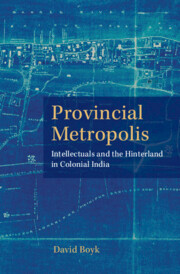Book contents
- Frontmatter
- Dedication
- Contents
- List of Figures and Maps
- Acknowledgments
- List of Abbreviations
- Note on Transliteration and Translation
- Introduction: Provinciality in Colonial India
- 1 A Length without Breadth
- 2 As Though in a Shrine
- 3 Collaborative Wit
- 4 A Sturdy Loyal People
- 5 Patna Capitalized
- Epilogue
- Glossary
- Bibliography
- Index
1 - A Length without Breadth
Published online by Cambridge University Press: 25 September 2025
- Frontmatter
- Dedication
- Contents
- List of Figures and Maps
- Acknowledgments
- List of Abbreviations
- Note on Transliteration and Translation
- Introduction: Provinciality in Colonial India
- 1 A Length without Breadth
- 2 As Though in a Shrine
- 3 Collaborative Wit
- 4 A Sturdy Loyal People
- 5 Patna Capitalized
- Epilogue
- Glossary
- Bibliography
- Index
Summary
Visitors to Patna in the seventeenth and eighteenth centuries were invariably impressed with what they found there. As “the chefest marte towne of all Bengala,” Patna was among the largest cities in India.1 It struck travelers as “a very sweet city and honoured place … a place of perpetual spring, … [among] the best of the cities of Hind” and a fitting home for “many traders and comfort-loving men.”2 By the end of the nineteenth century, though, it had become a dilapidated provincial town, merely one among several middling, semiagrarian cities lining the Ganges. In this chapter, I show what Patna's decline meant for the city and its people. Patna's shifting fortunes were molded by its place within the wider region, and they shaped every aspect of the city's geography. As Patna became increasingly provincial in the late nineteenth and early twentieth centuries, many of the consequences were felt most strongly in the older part of the city. The city's social landscape was restructured amid political contestations over health and sanitation, challenges to the nature of elite patronage and neighborhood leadership, and efforts—ultimately unsuccessful—to redirect the spatial changes taking place.
Nineteenth-century Patna was organized around two poles. In the east lay the historic Patna, built in the sixteenth century and renamed Azimabad in the early 1700s.
Information
- Type
- Chapter
- Information
- Provincial MetropolisIntellectuals and the Hinterland in Colonial India, pp. 34 - 71Publisher: Cambridge University PressPrint publication year: 2025
